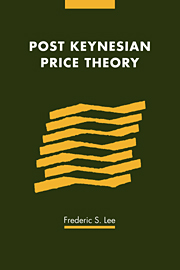Book contents
- Frontmatter
- Contents
- List of figures and tables
- Acknowledgments
- Introduction
- Part I The doctrine of administered prices
- Part II The doctrine of normal cost prices
- 4 The origin of the doctrine of normal cost prices: the Oxford Economists' Research Group and full cost pricing
- 5 Philip Andrews' theory of competitive oligopoly
- 6 Developments in the doctrine of normal cost prices
- Part III The doctrine of mark up prices
- Part IV The grounded pricing foundation of Post Keynesian price theory
- Appendix A Studies on cost accounting and costing practices
- Appendix B Studies on pricing
- Bibliography
- Index
6 - Developments in the doctrine of normal cost prices
Published online by Cambridge University Press: 22 September 2009
- Frontmatter
- Contents
- List of figures and tables
- Acknowledgments
- Introduction
- Part I The doctrine of administered prices
- Part II The doctrine of normal cost prices
- 4 The origin of the doctrine of normal cost prices: the Oxford Economists' Research Group and full cost pricing
- 5 Philip Andrews' theory of competitive oligopoly
- 6 Developments in the doctrine of normal cost prices
- Part III The doctrine of mark up prices
- Part IV The grounded pricing foundation of Post Keynesian price theory
- Appendix A Studies on cost accounting and costing practices
- Appendix B Studies on pricing
- Bibliography
- Index
Summary
After Andrews, the theoretical development of the normal cost prices doctrine took on a rather different form. Instead of being concerned with the larger picture of a non-neoclassical theory of pricing and prices, the subsequent contributors were more interested in particular facets of the doctrine. The purpose of this chapter is to delineate the developments that contributed most to the fleshing out of the doctrine, which includes the analysis of the costing margin; the notion of sequential production inherent in normal cost pricing procedures; the competitive process, social rules and institutions, and the determination of the market price; consumer behavior; and variations in the normal cost price. On the other hand, Kingsley Laffer's (1953) suggestion that a fuller analysis of the implications of reserve capacity for understanding the growth dynamics of the enterprise will be ignored, because it played no part in the doctrine's development. This was due in part to Andrews' unfavorable review of Edith Penrose's book The Theory of the Growth of the Firm (1959). Andrews, while agreeing that reserve capacity in management could exist, criticized Penrose's emphasis on it as the main source of growth. The emphasis on internal factors affecting growth was unsatisfactory, he argued, because it ignored the effect of the external environment on the enterprise's ability to grow. However subsequent economists, such as Scott Moss and Peter Earl, have argued that the compatibility of Penrose's work with the normal cost prices doctrine was much stronger than Andrews suggested.
- Type
- Chapter
- Information
- Post Keynesian Price Theory , pp. 117 - 140Publisher: Cambridge University PressPrint publication year: 1999

